




January Economic Update: Growth slows, prices rise
 DOWNLOAD
DOWNLOAD

Inflation Update: Up, up, and away?
 DOWNLOAD
DOWNLOAD

Quarterly Economic Growth Release: Growth takes on a slower pace
 DOWNLOAD
DOWNLOAD


Treasury bills seen to fetch slightly higher rates

RATES of the Treasury bills (T-bills) on offer this week could be steady or slightly higher, tracking secondary market levels ahead of the Bangko Sentral ng Pilipinas’ (BSP) policy meeting.
The Bureau of the Treasury (BTr) will auction off P15 billion in T-bills on Monday, made up of P5 billion each in 91-, 182-, and 364-day papers.
The scheduled offering of three-year Treasury bonds (T-bonds) on Tuesday was canceled to make way for the government’s ongoing retail Treasury bond (RTB) offer.
“Upcoming Treasury bill auction yields could be higher after the comparable PHP BVAL (Bloomberg Valuation Service) yields corrected slightly higher week on week,” Rizal Commercial Banking Corp. Chief Economist Michael L. Ricafort said in a Viber message.
At the secondary market on Friday, the rate of the 91-, 182-, and 364-day papers rose by 6.71 basis points (bps), 3.72 bps, and 2.02 bps week on week to 4.3439%, 4.9379%, and 5.3252%, respectively, based on the PHP BVAL Reference Rates published on the Philippine Dealing System’s website.
“According to our traders, the market will continue to trade sideways as we await the Monetary Board (MB) meeting outcome on Thursday and other developments in the RTB sale,” UnionBank of the Philippines, Inc. Chief Economist Ruben Carlo O. Asuncion said in a report.
“On the back of the hotter-than-anticipated January inflation of 8.7% year on year and its trajectory, we now expect the MB to accelerate its terminal policy rate of 6% as the policy outcome in Thursday’s meeting,” Mr. Asuncion added.
The government last week raised an initial P162.18 billion from the rate-setting auction for its offer of 5.5-year RTBs.
Tenders for the offer hit P196.109 billion, or more than six times the P30 billion on the auction block. The RTBs fetched a coupon rate of 6.125%.
The offer period for the retail bonds is set to run until Feb. 17, while settlement is on Feb. 22.
Meanwhile, the BSP’s policy-setting Monetary Board is widely expected to raise benchmark interest rates at its meeting on Thursday, with most analysts penciling in a 50-bp increase after headline inflation hit a 14-year high in January.
A BusinessWorld poll last week showed 17 out of 18 analysts see the Monetary Board hiking borrowing costs at its first meeting of the year. Nine analysts see a 50-bp hike, while eight anticipate a 25-bp increase.
Headline inflation was at a 14-year high of 8.7% last month, faster than the 8.1% in December and 3% a year ago.
This was also above the 7.6% median estimate in a BusinessWorld poll and the 7.5% to 8.3% forecast range given by the central bank for the month.
The BSP in December raised rates by 50 bps, bringing its policy rate to 5.5%, the highest since November 2008 when it was at 6%.
The rates on the central bank’s overnight deposit and lending facilities were also increased to 5% and 6%, respectively.
The move brought total increases for 2022 to 350 bps.
Last week, the BTr raised P15 billion as planned from the T-bills it auctioned off as bids reached P37.786 billion, more than twice the amount on offer.
Broken down, the Treasury raised P5 billion as programmed via the 91-day T-bills, with tenders reaching P6.756 billion. The average rate of the three-month papers inched up by 3.4 bps to 4.186%, with accepted rates ranging from 4.12% to 4.245%.
The government also made a full P5-billion award of the 182-day securities as bids for the papers reached P10.15 billion. The six-month tenor was quoted at an average rate of 4.867%, declining by 0.8 bp, with accepted rates at 4.82% to 4.923%.
Lastly, the BTr borrowed P5 billion as planned from the 364-day debt papers as demand for the tenor reached P20.88 billion. The average rate of the one-year T-bill fell by 6.2 bps to 5.292%. Accepted yields were from 5.27% to 5.317%.
The Treasury wants to raise P130 billion from the domestic market this month, or P60 billion via T-bills and P70 billion via T-bonds. The T-bond borrowing program was initially at P140 billion but the government canceled two bond auctions make way for its RTB offer.
The government borrows from domestic and external sources to finance its budget deficit, which is capped at P1.47 trillion this year or 6.1% of gross domestic product. — Aaron Michael C. Sy
This article originally appeared on bworldonline.com





 By BusinessWorld
By BusinessWorld